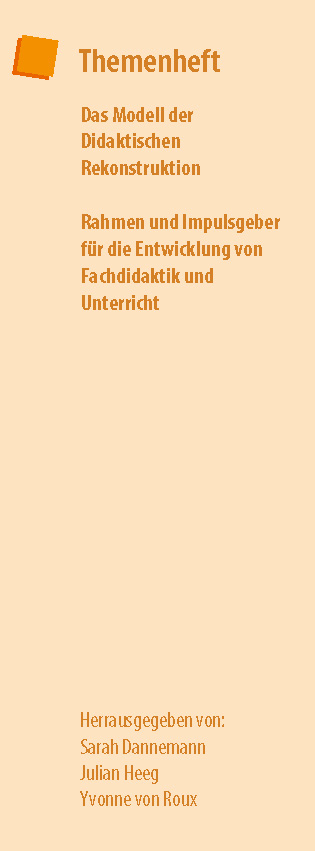Fostering Pre-Service Teachers’ Diagnostic Abilities Regarding Students’ Conceptions
Anwendung der Didaktischen Rekonstruktion zur Gestaltung eines hochschuldidaktischen Seminars
DOI:
https://doi.org/10.11576/hlz-2703Keywords:
Diagnosis, Model of Educational Reconstruction, Students’ Conceptions, Chemical Education, Teacher EducationAbstract
The development and training of skills enabling pre-service teachers (PSTs) to diagnose students’ conceptions is an important aspect of university teacher education. In order to achieve this goal, a course concept using the Model of Educational Reconstruction as a scaffold was created and tested at the University of Hannover in the field of chemical education. The goal of this article is therefore twofold: Firstly, a course concept for the development and training of pre-service teachers’ diagnostic skills will be presented. Secondly, the concrete use of the Model of Educational Reconstruction for establishing a course will be outlined. PSTs’ feedback and evaluation from two years show that PSTs’ knowledge and abilities regarding students’ conceptions increase during the course. Furthermore, PSTs’ perception of students’ conceptions as well as their critical role for learning change towards an appreciating perspective. When confronted with alternative conceptions, PSTs begin to reflect critically on their own content knowledge and draw parallels between their personal learning processes and those of the students. In addition, starting points for future courses are outlined.
-
Abstract1084
-
Beitrag 823
-
Online-Supplement 1 0
-
Online-Supplement 2 0
Published
How to Cite
Issue
Section
License
Copyright (c) 2021 Julian Heeg, Robert Marten Bittorf, Sascha Schanze

This work is licensed under a Creative Commons Attribution-ShareAlike 4.0 International License.
Sämtliche Inhalte der HLZ werden freigegeben unter der Creative-Commons-Lizenz Namensnennung, Weitergabe unter gleichen Bedingungen, Version 4.0 International (CC BY-SA 4.0). Die Urheber_innen und die Rechteinhaber_innen der in der HLZ veröffentlichten Beiträge gewähren grundsätzlich allen Nutzer_innen unwiderruflich das freie, weltweite Zugangsrecht zu diesen Veröffentlichungen. Unter der Bedingung, dass Autor_innen und Herausgeber_innen gemäß der Zitationshinweise sowie die Lizenz als »Lizenz: CC BY-SA 4.0« einschließlich der untenstehenden Lizenz-URL genannt werden, dürfen die Beiträge der HLZ vervielfältigt, weitergereicht und auf beliebige Weise genutzt werden, auch kommerziell und ebenso online wie in gedruckter oder anderer Form. Auch die Bearbeitung ist erlaubt unter der zusätzlichen Bedingung, dass das neu entstandene Werk als Bearbeitung gekennzeichnet wird und im Falle einer Veröffentlichung unter derselben Lizenz wie in der HLZ freigegeben wird.





